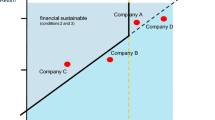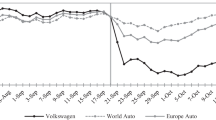Abstract
In this paper we investigate the neutrality of tax allowances by considering the Croatian and the German profit taxes. Our mathematical analysis shows that in the Croatian system, neutrality cannot be attained by the allowance for corporate equity if the tax free rate of interest does not equal the individual discount rate. The sensitivity analysis shows that in the Croatian system, the profitability of early tax reductions by tax write-offs falls below the profitability in the German system by a maximum of only 2.5 percentage points. In the system that provides an allowance for corporate equity, the profitability of an early tax reduction is high enough to influence investment decisions.
Similar content being viewed by others
Bibliography
Bradford, David F. and the U.S. Treasury Tax Policy Staff (1984), Blueprints for Basic Tax Reform, 2nd Edition.
Boadway, Robin/Bruce, Neil (1984), A general proposition on the design of a neutral business tax, in: Journal of Public Economics, Vol. 24, pp. 231–239.
Heinhold, Michael (1996), Unternehmensbesteuerung Bd. 3: Investition und Finanzierung.
Heinhold, Michael (1999), Zur Entscheidungsneutralität konsumorientierter Steuersysteme, in: Altenburger, Otto A./Janschek, Otto/Müller, Heinrich (Hrsg.), Fortschritte im Rechnungswesen, Gerhard Seicht zum 60. Geburtstag, S. 73–99.
IFS — The Institute for Fiscal Studies (1978), The Structure and Reform of Direct Taxation, Report of a Committee chaired by Professor J. E. Meade.
Jacobs, Otto H. (1997), Ist die zinsbereinigte Besteuerung ein Ansatz zur Harmonisierung der Unternehmensbesteuerung in Europa?, in: Burmester/Endres (Hrsg.), Außensteuerrecht, Doppelbesteuerungsabkommen und EU-Recht im Spannungsverhältnis, S. 222–228.
Kaiser, Monika (1992), Konsumorientierte Reform der Unternehmensbesteuerung.
Kiesewetter, Dirk (1997), Theoretische Leitbilder einer Reform der Unternehmensbesteuerung — Eine vergleichende Analyse der Reformmodelle Kroatiens, Österreichs und Skandinaviens, in: Steuer und Wirtschaft, 74. Jg., S. 24–34.
Kruse, Heinrich W. (1998), Öko-Steuern und Öko-Abgaben, in: Betriebsberater, 53. Jg., S. 2285–2288.
Lammersen, Lothar (1999), Die zinsbereinigte Einkommen- und Gewinnsteuer.
Lang, Joachim (1993), Entwurf eines Steuergesetzbuchs.
Neumark, Fritz (1970), Grundsätze gerechter und ökonomisch rationaler Steuerpolitik.
Rose, Manfred (1991), Plädoyer für ein konsumbasiertes Steuersystem, in: Rose, Manfred (Hrsg.), Konsumorientierte Neuordnung des Steuersystems, S. 7–34.
Rose, Manfred (1990), The superiority of a consumption-based tax system, in: Heidelberg Congress on Taxing Consumption, pp. 3–28.
Rose, Manfred (1989), Argumente zu einer konsumorientierten Neuordnung des Steuersystems, in: Steuer und Wirtschaft, 66. Jg., S. 191–193.
Schmidt, Frank (1998), Allowance for Corporate Equity — Zinskorrigierte Besteuerung zur Harmonisierung der Steuersysteme in Europa.
Schneider, Dieter (1992), Investition, Finanzierung und Besteuerung, 7. Aufl.
Schwinger, Reiner (1992), Einkommens- und konsumorientierte Steuersysteme.
Sievert, Olaf et al. (1989), Steuern und Investitionen, Teil 2.
Spengel, Christoph (1998), Wettbewerbswirkungen der Körperschaftsteuer in Europa — Analyse und Reformvorschläge, in: Die Betriebswirtschaft, 58. Jg., S. 348–368.
Wagner, Franz W./Schwinger, Reiner (1991), Der Einfluß einer Cashflow-Steuer auf Finanzierung und Rechnungslegung, in: Rose, Manfred (Hrsg.), Konsumorientierte Neuordnung des Steuersystems, S. 495–521.
Wagner, Franz W. (1995), Leitlinien steuerlicher Rechtskritik als Spiegel betriebswirtschaftlicher Theoriegeschichte, in: Elschen, Rainer/Siegel, Theodor/Wagner, Franz W. (Hrsg.), Unternehmenstheorie und Besteuerung, S. 723–746.
Wenger, Ekkehard (1983), Gleichmäßigkeit der Besteuerung von Arbeits- und Vermögenseinkünften, in: Finanzarchiv, 41. Jg., S. 207–252.
Wenger, Ekkehard (1997), Traditionelle versus zinsbereinigte Einkommens- und Gewinnbesteuerung: vom Sammelsurium zum System, in: Standpunkte zur aktuellen Steuerreform, (Schriften des Betriebsberaters), S. 115–140.
Author information
Authors and Affiliations
Corresponding author
Rights and permissions
About this article
Cite this article
Heinhold, M., Hüsing, S. & Pasch, H. Consumption-Based Tax Systems and Investment Neutrality: Does the Corporation Income Tax Depreciation Method Impact Investment Capital Value?. Schmalenbach Bus Rev 52, 261–281 (2000). https://doi.org/10.1007/BF03396620
Published:
Issue Date:
DOI: https://doi.org/10.1007/BF03396620




